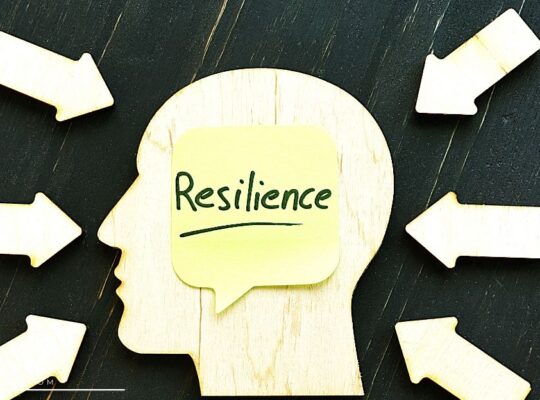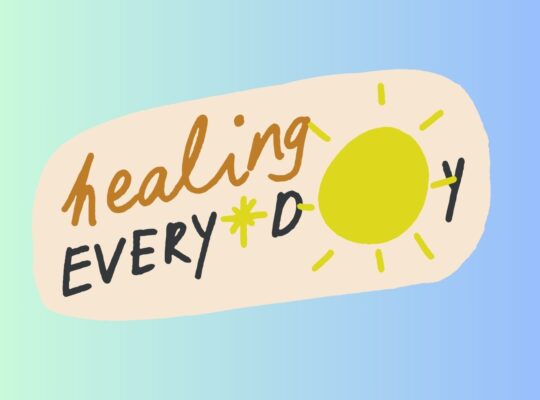A Look At Perspective
We all want what’s best for ourselves in life. For most folks, this involves all areas of life: professional, family, financial, educational, and personal, just to name a few. If the idea of achieving the best results in all these different areas of life feels overwhelming, consider the perspective you’re taking when you imagine your future.
Perspective refers to the particular point of view or attitude you have toward something. When you have a negative perspective toward yourself or your ability to accomplish something, it negatively impacts your chances of actually accomplishing what you want to do.
This tends to feed into an unhealthy cycle. The more you allow your negative perspective to overshadow your abilities to do something, the less you accomplish. When you accomplish less, you make yourself feel worse. Feeling bad about yourself feeds into your negative perspective, which fuels the cycle to begin all over again.
Fortunately, it is possible to break away from having a negative perspective. Like many other traits and habits, people can turn this negative one into a healthier, more positive one. Like changing any other behaviors, learning to develop healthier perspectives requires lots of time, effort, and practice. While it isn’t something that will be perfected overnight, consistent work and determination can change your perspectives to be healthier.
What does it mean to have healthy perspectives? How does having a healthy perspective affect yourself and others?
People with healthy perspectives have a generally positive and pleasant outlook on life. Maintaining a positive outlook is a vital part of being resilient. When you’re able to keep your mind focused on a healthy perspective of what’s happening, you’re able to “bounce back” quicker and continue moving forward with life rather than stagnating and feeling stuck.
People who have a hard time maintaining healthy perspectives often catch themselves trapped in the aforementioned negativity loop.
It would be easier if nobody ever had to face troubles in life, but we all understand the universal truth that life is rarely all sunshine and roses–people get slammed with difficult and unexpected stuff all the time. Life can be incredibly difficult and downright unfair. In the face of adversity and hardship, how does one manage to maintain a healthy perspective?
Having a healthy perspective requires practice. When we’re faced with tough news, unexpected loss, or a sad turn of events, it can be difficult to have a healthy outlook on the future and continue forward.
However, having healthy perspectives requires a delicate balancing act of multiple considerations, including:
- Your own emotions
- How the unexpected/bad event is affecting others
- The facts of the situation
- What can be done to mitigate the situation and move forward
When you maintain a healthy perspective, you’re not only protecting yourself from an even worse experience, but you’re also helping others affected by what’s happening in a more productive way. Think about it this way: If you and a friend are experiencing a mutual hardship, and they’re clearly struggling to pull themselves together and maintain a positive perspective, your positivity may be needed to help both of you work through the current dilemma. Alternatively, a person you care about could be facing their own hardship and be in desperate need of a friend with healthier perspectives to help them through the storm–this is where your own healthy perspectives can come in and help.
How does resilience and having a healthy perspective connect?
Healthy perspectives and resilience work together as a team. By maintaining positive perspectives, you’re able to bounce back faster after experiencing a hardship. Likewise, because you have a strong sense of resilience, it’s easier for you to maintain your positive perspective on whatever situation is unfolding. In this sense, by practicing one, you are strengthening both.
Folks with high resiliency typically keep positive, healthy perspectives throughout their lives. No matter what’s going on or how those events are affecting them, they’re able to assure themselves that things can be OK. They are able to focus on the facts of a situation and put in the work necessary to get themselves back on course after experiencing hardship or setbacks.
What are some ways having a healthy perspective can help you live well and achieve the best results in life?
Maintaining healthy perspectives requires a lot of work in different areas of life. While this does require effort, the payoff is excellent–you end up benefiting from your work in a variety of ways. Consider the following ways having a healthy perspective can benefit you in life:
1| You bounce back from a setback quicker than ever.
Not having a plan work how you wanted is the worst. However, when you maintain a healthy perspective on a failure, you can treat that failure like information collecting instead.
Rather than wallowing in your failure and continuing to feel bad for yourself, analyze what went wrong and why your attempt failed. Take this information and use it in a resilient “bounce back” by applying it to a new attempt. Yes, the setback may have taken you off course for a moment but having a healthy perspective on the situation helps you redirect your route based on what you learned from the failure.
2| You learn how to avoid negative people and situations.
Life is already tough enough, so why would you want to add to it by participating in other negative behaviors or by spending time with negative people? Having a healthy perspective on life can help you avoid this extra negativity!
Part of maintaining a healthy perspective means that you’re taking care of yourself and keeping yourself from experiencing any avoidable negative situations. If you have an old friend who constantly whines, complains, and maintains a negative attitude, you learn to distance yourself from those negative vibes. If you see a group of negative naysaying coworkers huddled in the break room, you learn to avoid getting sucked into their conversations and complaints. By keeping your healthy perspective, you’re protecting yourself from unnecessary negative experiences.
3| You’re much kinder to yourself.
You are always going to be your best asset throughout life. Even in the toughest times and situations, you’ll always be able to depend on yourself. When life is unpredictable, you can always count on yourself to control your emotions and reactions to life’s unexpected twists and turns.
When you maintain a healthy perspective, you’re treating yourself kindly. You know your value and how important your mental health is–by choosing to maintain your positive outlooks on life, you’re asserting your importance to yourself by moving forward and keeping a clearer, happier Mindspace.
4| You’re able to set boundaries and say “no” when you need to do so.
If you’ve ever been a people pleaser, you know how incredibly exhausting it can be. Trying to make everyone happy is impossible, and people with healthy perspectives understand this well.
When you have a healthy perspective on a negative situation, you know when it’s best for you to either get involved or distance yourself from the events. If you can be of assistance, great! If the situation is going to be taxing or draining on you, you understand that it’s best to avoid it in order to protect your mental health and stamina. Rather than wasting energy by allowing someone to break your boundaries, you protect your stores by establishing and upholding your personal boundaries.
5| You find contentment and happiness in the simple things.
By maintaining a healthy perspective, you don’t allow yourself to get tied up in complicated and unnecessary wants and desires. Instead, you allow yourself to find happiness in life’s simpler pleasures.
Having a healthy perspective means you’re able to appreciate the things you already have in life, even as you’re working toward improving yourself and trying new things. While other people with negative perspectives miss the importance of what they already have, people with healthy perspectives appreciate everything.
7 Ways To Develop A Healthy Perspective
If I Want To Develop A Healthy Perspective, How Do I Begin?
Developing a healthy perspective requires some practice, particularly if you’re starting from a mostly negative headspace. Fortunately, there are some steps you can take to practice to get yourself into a healthier, more positive perspective.
1| Put time and energy into taking care of your whole self–physically, spiritually, and mentally.
It’s tough to view anything positively or maintain a healthy perspective when you, yourself, aren’t feeling your best. Make sure you’re taking time to pay attention to all your health needs. Spending time and energy to cultivate your whole self-ensures that you’re able to bring a healthy perspective to all of life’s challenges.
Taking care of your whole self has elements connected to your mind, body, and spirit. A few examples of how you can take care of your whole self-include:
- Taking time to meditate and/or practice mindful behaviors
- Eating healthy, nutritious meals
- Getting plenty of sleep
- Taking time to practice a hobby you enjoy
- Going to all your medical checkups and appointments
- Establishing and enforcing your personal boundaries with other people
- Spending quality time with people you love
- Getting plenty of physical movement and exercise
While some people may feel that spending time on themselves is a waste compared to their massive to-do list, the truth is that someone who isn’t properly caring for themselves can’t possibly have the energy to tackle that to-do list in the first place. People with healthy perspectives know they need to “fill up” their personal gas tanks using self-care before they can set off on their latest adventures.
2| Practice using positive wording and rephrasing to replace negative thoughts.
If you have a habit of negative naysaying, complaining, or having a generally bad attitude, it can be tough to overcome it and think more positively. However, replacing this use of negative thoughts and language is a key step to developing healthier perspectives.
A good way to begin this process is to first identify your common negative phrases or thoughts. For example, if you have a particular distaste for part of your job, you may begin to dread when it’s time to do it. In your mind, you’re thinking about how awful the task is going to be and generally approaching the whole task with a dark cloud of bad thoughts, making an unpleasant task even worse.
The next time you catch yourself thinking this way, force yourself to stop and reframe your thoughts in a more positive way, such as:
- The sooner I get started, the sooner this task will be done.
- I have completed this task successfully before and I can do it again.
- This task is the toughest part of my work day; if I can do this, then I can handle anything else that might happen today.
- This task is difficult, and I am a [strong, smart, capable, etc.] person for getting it done.
- The more I practice completing this task, the quicker I’ll get at doing it.
- I am [smart, strong, capable, determined, etc.] enough to get this task done.
These phrases still acknowledge your truth about the situation (the task itself isn’t fun or enjoyable) but forces you to approach it from a more positive perspective. Using this kind of rephrasing exercise will, over time, help you foster a healthier perspective.
3| Distance yourself from bad influences and toxic relationships.
Everyone has had relationships of some sort that weren’t good for them. This is absolutely not only limited to romantic relationships–you can experience a toxic relationship in many forms, including familial, friendships, professional, and more!
Unfortunately, many people never realize the damages they can cause by harboring a constantly negative attitude. Some people seem to maintain a dark storm cloud of negativity around them at all times by feeding it with complaining, whining, gossiping, and more. Rather than working toward real solutions or keeping their words kind, these types of bad influences would rather stay in their negativity bubble.
It’s very easy (and also quite tempting) to fall into the trap of the negative naysayers’ toxicity. If you spend a lot of time with folks who enjoy being negative, those habits and attitudes tend to affect you. You may notice yourself complaining, gossiping, and feeling unmotivated to be helpful just like the others.
Realize that you have the ability to say no to these kinds of bad influences and toxic relationships. Setting these kinds of boundaries is tough business–and may be difficult for the toxic folks to understand–but the sooner you distance yourself from this negative social bubble, the healthier your perspectives will become.
4| Spend time building relationships that help you feel positive, fulfilled, and happy.
This step toward healthier perspectives connects directly with the previous point. While it’s a good idea to distance yourself from negative relationships and folks with toxic behaviors, there are other types of people who emit positivity and happiness. These are the types of people you want on your side throughout life.
Consider the folks you admire in your life. Do you have a coworker who has amazing organization skills? Do you have a friend who can always think of a good solution to a problem? Are your parents really great at handling a crisis situation? Does your brother always seek out new, fun adventures? These are the types of relationships you should spend time fostering and growing!
When you spend more time around people who also have healthy perspectives in life, it makes it easier for you to do the same. Nobody is always going to have a picture-perfect life, and everyone will experience bad days, but having a healthy perspective keeps you moving through these tough times. Surrounding yourself with like-minded people will help your healthy perspective grow even more.
5| Allow yourself to accept that you’ll never have total control over what happens in your life.
All of life’s problems would melt away if we had the power to control how everything happens. It’s a perfect scenario: anytime something bad happens, you could use a touch of magic to wipe it away and fix the whole problem.
Better yet, you could use that touch of magic to stop problems from ever happening in the first place. If this sounds like the plot of a fantasy novel, it’s because it is the stuff of fantasies. It would be great if life worked this way, but unfortunately, it doesn’t. Life throws unpredictable situations at us constantly.
A key step to developing healthy perspectives is to accept that you’ll never be able to totally control everything that happens to you. Your coworkers will make mistakes, people you care about will have accidents or develop illnesses, and important files will be accidentally deleted.
Technology will fail, bad weather will ruin plans, and you will forget about an appointment on your calendar. Whether it’s something mildly inconvenient or incredibly upsetting, these types of unexpected surprises pop up constantly, and they’re often out of our control.
People tend to harbor the unrealistic belief that they can keep control over everything, but this is an impossible feat. Life is always going to have unpredictable moments. Instead of riding against the natural flow of life, learn to accept that you don’t have total control over everything that happens.
Repeating this to yourself seems unnatural at first, but it is a crucial step to building healthier perspectives in life. The sooner you do so, the sooner you’ll feel some of the tension and stress melt away from trying to maintain an impossible amount of control over everything happening.
6| Remember that you have the personal ability to make good, smart, and healthy choices in any scenario.
While you don’t have complete and total control over everything that pops up in your life, you do have that level of control over one major aspect–yourself!
In any situation, you get to decide how you’re going to react and take action. This realization is an important part of keeping healthy perspectives. For example, folks who allow their emotions to take over immediately often don’t have healthy perspectives.
Emotional reactions are usually not the best route to take–because they’re driven by your emotions, they’re often poorly planned and “spur of the moment.”
People who approach themselves with a healthy perspective value their ability to make the best choices possible when it comes to how they want to react or take action in a situation. These people can take their emotions (they are natural and we all have them, no matter how much self-control you have) and set them aside while they examine the facts of what’s happening.
Being able to control yourself, especially in the toughest of situations, helps create better outcomes overall. Choosing to react in a way that’s helpful and positive rather than sudden and emotionally driven ensures that you’re approaching the situation the very best way you possibly can. Even when it feels like everything is going wrong, you can maintain a healthy perspective by controlling how you personally decide to handle it.
7| Practice looking at the positives and the negatives of all situations.
Having a healthy perspective doesn’t mean you only see the world through rose-colored lenses. You acknowledge that bad things can happen as well as good things. However, people with healthy perspectives are good at acknowledging positives and negatives when they analyze the possibilities of a situation.
Due to humans’ negativity biases, we tend to jump straight to negative conclusions when faced with a problem. Having that negativity bias is natural–it keeps us aware of dangers so we can avoid them and stay safe. Unfortunately, this can also cause a lot of stress and anxiety. Constantly worrying about everything that could go wrong is emotionally draining and exhausting.
Having a healthy perspective is a delicate balance of seeing both the positives and the negatives of things. For example, you can acknowledge the likelihood of something bad happening, but you also realize that you aren’t 100% sure that the “bad thing” is going to be the reality. You accept that the situation could also end positively! Seeing the positive possibilities is a challenge when those negative options are also looming in the background but acknowledging both is an important part of having a healthy perspective.
4 Ways To Determine What Your “Best” Results Will Be In Life
Everyone defines success differently, and this is a good thing! If you ever find yourself overly concerned with others’ successes, remember that you aren’t them. Just because they’ve found success by one route doesn’t mean you absolutely have to do the same thing or travel the same path they did.
Part of having a healthy perspective is understanding what’s going to be “best” for you and your life. While it’s great to admire others’ achievements and have role models, their pathways aren’t the only ways to find success and happiness in life.
Trying to understand what you truly want to achieve in life can feel noisy and overwhelming. If you struggle to figure out what you want, know that you aren’t alone–many successful people felt the exact same way at some point early in their own journeys to happiness and success. Eventually, they determined the right courses of action for themselves and set into action. How do you determine your own right course?
There are many methods you can use to develop your vision of what success, living well, and achievement mean for you. Testing and trying different methods is much like trying on new clothes at the store–some will fit oddly and uncomfortably, but you’ll eventually find something that fits your needs “just right.”
Consider the following methods as you set out to determine your own success pathways and healthy perspectives.
1| Use meditation and visualization to build a picture of what “living well” and “best results” means to you.
Meditation is a powerful tool if you need to learn and understand more about yourself. If you have a particularly noisy mind, meditation can help bring a sense of quiet to your thoughts, allowing you to begin constructing your “big picture” image of the things you want to achieve in life.
This meditative practice is called visualization, which is putting together a concrete mental image of what your pathway toward a certain goal will look like. Having these meditative and visualization sessions are a key to feeding your healthy perspectives and ensuring you’re building a solid understanding of what living well and achieving the best means for you.
2| Step away from social media (and anything else that allows you to unfairly compare yourself to others).
Comparison is truly the thief of joy. When you spend too much time analyzing other people’s successes, possessions, or achievements, it can cloud the way you feel about your own progress or definitions of success.
Any time you hear someone bragging, whether it’s happening in real life or behind your smartphone screen, you must remember that you’re only privy to that person’s “highlight reel.” People typically don’t post or brag about the mundane, ordinary, or unfortunate stuff that happens in their lives.
If you could see behind the privacy curtain, you’d see a lot of slip-ups, mistakes, and failures along that person’s pathway to success. It’s tough to remember this fact, but it’s true for everyone. Social media serves as a place where people post only the latest and greatest information about themselves; their whole lives aren’t a constant stream of fortune and success.
Taking time to step away from social media is a good way to center yourself back into reality. Remember that you’re in control of your own journey and working toward the goals you want to meet.
A major key to keeping a healthy perspective about your own progress is to remember that you’re on a path that’s made for you specifically–because of your uniqueness and individual experiences, your path is designed to suit you. Someone else’s pathway may not be the right fit for you, and that is totally normal.
3| Be willing to develop a flexible and adventurous attitude.
Being a little adventurous and very flexible will take you a long way in life. When you’re trying to determine what your “best” results will be in life, don’t limit yourself to only the things you know.
If you’re willing to try new things, experiment with new experiences, and develop new skills, you’ll broaden the possibilities of what you can achieve in life. Although life can throw you a lot of unexpected twists and turns, you can embrace that sense of adventure and unknown. Taking those “leaps of faith” into something new by being flexible and willing to put yourself into new territory is how you grow as a person.
As you venture into new possibilities, you open yourself to a world of opportunities. As you continue to personally grow and develop, what you define as a “best” result for yourself might change along the way as well. What once seemed impossible for you to accomplish may seem much more doable as you learn more skills and develop your sense of adventure.
Additionally, people with a sense of adventure and flexibility often find themselves available for more opportunity in life. Keeping a healthy perspective about embracing change, trying new things, and being willing to learn opens a ton of doors for you.
4| Find your personal inner voice and honor it above the others you hear.
Life is full of voices telling us what we should and shouldn’t do. If you listen to people, you admire and respect for advice, by all means, do so! We can learn so much by listening to wise, knowledgeable, and experienced people.
However, there are also many negative, noisy voices in life that can make it hard to determine what’s really “best” for you. You may question everything you’ve ever believed or thought about yourself because of a comment from a parent or friend, for example.
Learn to honor your own personal inner voice above the others in your life. When other people are projecting their thoughts and beliefs onto you, remember to silence them for a second and check in with yourself. Ultimately, you are the expert on your life. You call the shots and are best at determining what is “best” for you.
Final Thoughts
The Bottom Line: Taking time to build healthy perspectives ensures you’re going to live well and achieve the best results in life.
Any scenario can be made better when approached with a healthy perspective. Essentially, when you choose to have a more positive attitude about something happening, an opportunity, or an unfamiliar situation, you’re setting yourself up to achieve the best results you possibly could.
Even in the worst possible situation, approaching it with a healthy perspective sets you up to have a better experience. Even in the worst situation possible, a healthy perspective will ensure you’re shielding yourself from the damages of negativity.
Any time you’re faced with challenges or trying to advance yourself toward success, your healthy perspective will be one of the strongest tools you have to keep yourself on the best track possible. Even when things don’t work out the way you want, a healthy perspective keeps your reality in check–you can learn valuable information from any failure and use it to keep pushing forward.







